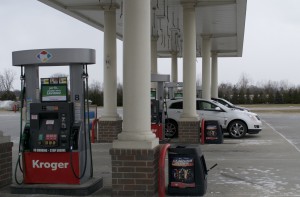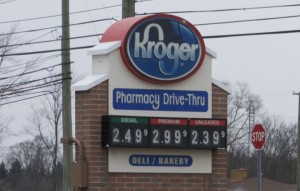
Normally a holiday weekend means a jump in gas prices, but not this Thanksgiving as they have dropped 7 cents in the last week.
This is the time of year that folks should be getting ready to enjoy Thanksgiving by piling into a car and trekking off to a family members’ house and celebrate the season — and paying way more for gas than normal.
“Should be” is the key part of that sentence, but this year appears to be different.
Instead of taking their slow climb upward, gas prices are actually falling as the Thanksgiving holiday travel period approaches. Oil prices, due to an ample supply, are declining, which drives down the price of gas.
Gas prices were close to a four-year high in October, topping $2.90 per gallon. However, due to drop in oil prices they’ve fallen.
(Driving to Thanksgiving dinner? It’ll cost more and take longer. Click Here for the story.)

Despite the expected decline, gas prices are going to be higher this holiday weekend than last year's Thanksgiving weekend.
“Thanksgiving gas prices are getting carved up at a time of year when we’re all used to getting the turkey ready,” Patrick DeHaan, senior petroleum analyst at fuel-finding app GasBuddy, told USA Today. “This is a fairly dramatic turnaround.”
Prices hit their 2018 high for U.S. crude in early October, but in a move some analysts have described as “bewildering,” the prices since then have fallen steadily by $20 a barrel.
(Click Here for about car crashes are on the rise in “pot-legal” states.)
The national average was $2.68 per gallon on Wednesday, down 7 cents from a week earlier and 22 cents from a month earlier, according to AAA. However, the news isn’t all good as gas prices are still up 12 cents from a year ago.
DeHaan predicts the prices will drop further, down into the $2.50 to $2.60 range by the time the holiday weekend, which is Nov. 21-25, hits. The change in price is dramatic, if for no other reason than the number people impacted.
More than 54 million Americans are expected to travel at least 50 miles for Thanksgiving, according to AAA, marking a 4.8% jump from last year. The number represents a 13-year high.
